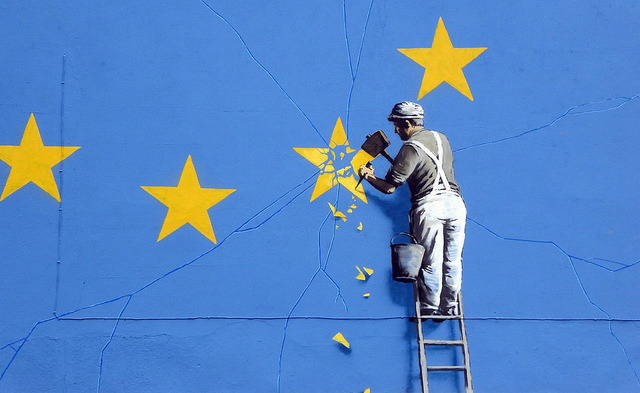‘Let’s not beat around the bush’, the German chancellor, Angela Merkel, said in response to the British decision to leave the European Union (EU), ‘today marks a watershed for Europe’. For some six decades, and numerous setbacks notwithstanding, Europe’s path has been unidirectional: towards an ever closer and ever wider union. No longer. A series of crises that have seriously tested Europe’s unity – the eurozone crisis, the EU-Russia conflict over Ukraine, the refugee crisis – was followed in June 2016 by an event that will result in an EU that is smaller in its geographic scope and weaker both economically and politically.
Nevertheless, political earthquakes also create unique opportunities for conceptual clarity. Exceptional challenges show which structures and political constellations are viable and which are not. Will there be an EU in five or ten years from now that resembles what we have now? Will there be a UK in five or ten years from now that resembles what we have today? I am less confident about the former than the latter, but both political entities face key challenges in the years to come, and in both cases they are centred around the contestation of sovereignty. In fact, Brexit both illuminates, and has been shaped by, competing understandings of sovereignty.
How did we get here?
The UK has been rightly described as a reluctant member of the Union, with its antiquated political institutions and a strong attachment to parliamentary sovereignty, which sit uneasily with the continental project of a European federation in the making. Both the Conservative and the Labour Party have had an ambivalent relationship with Europe. It was thus primarily a party political gamble that the then British prime minister, David Cameron, took when he promised a referendum on the UK’s EU membership.
Clearly, a referendum is a potent instrument of democratic control. It is also crude, because it can generate only simple results: ‘yes’, or ‘no’ are seldom satisfying answers in politics. What is more, resorting to the people as the highest arbiter of political conflicts is very much at odds with the distinctly British ideal of parliamentary sovereignty. And yet, it is hard to challenge its legitimacy in a constitutional monarchy that like all Western democracies conceives of the people as the ultimate source of power. The slogan of the Brexiters, ‘taking back control’, was thus primarily about democratic sovereignty (however odious that slogan might have seemed to many of its critics).
The referendum was to be preceded by a reform deal, which should have made the EU more palatable to the British electorate by reducing its federalist impetus. While Cameron failed to achieve significant reforms, he secured an important symbolic victory. In February 2016, the EU Council accepted the British demand to be excluded from the EU’s founding ambition to forge ‘an ever closer union’. This was too little too late both for the UK and the EU. Less controversially, it was too little for the UK: the concessions failed to prevent the British from voting out. But it was also too little, too late for Europe as a whole. The limits of European integration should have been acknowledged by the EU’s leaders at the outbreak of Europe’s sovereign debt crisis in 2010 at the latest. Its outbreak marked the collapse of the unique European experiment with postnational democracy. It exposed the fallacy of the theoretical construct underpinning this project: the idea that the age of sovereign nation states is over, and that sovereignty can and ought to be shared.
I contend that the celebration of the EU as marking ‘the emergence of the first truly postmodern international political form’ proved premature. Europe’s attempt to ‘reinvent itself beyond territoriality and outside of fixed frontiers’ has backfired, exacerbating political fragmentation, instability and economic malaise. The ‘unbundling of territoriality’ cited by Ruggie also reduced the EU’s ability to respond to external challenges – whether it was Russia’s imperialist ambitions towards its ‘near abroad’, or the influx of refugees from the Middle East. Europe’s ‘fuzzy borders’ appear attractive in good times. In times of crisis, the calls for (some) control over borders appear irresistible. Whether we like it or not, the fear of uncontrolled migration from within and outside the EU played an important role in the UK referendum and remains a potent source of Euroscepticism in continental Europe. The relative success of the Alternative for Germany (AfD) party in the September 2017 German federal elections can be cited as the most recent example of this trend.
Sovereignty obsolete?
Sovereignty is an elusive concept. Like its sibling, the state, it is impossible to define. In fact, for many scholars of European integration (particularly in Germany), both national sovereignty and the nation state have become obsolete. In an increasingly interdependent world, so the argument goes, any talk about sovereign power located at the nation-state level is misplaced. In an age of globalization, Saskia Sassen argued, ‘sovereignty has been decentered and territory partly denationalized’. The doyen of EU constitutionalism, Joseph Weiler, spoke for many when he remarked that ‘to protect national sovereignty is passé’.
Defending his postnational vision of European unity, Jürgen Habermas, for example, remains defiant. An experiment that hardly started cannot be declared to have failed, Habermas argued shortly after the Brexit, advocating a more social Europe that would address concerns of EU citizens, rather than just serving the interests of its technocratic elites. In a similar vein, Ulrike Guérot seeks to build on the federalist ideals of the EU’s founding fathers, such as the first European Commission president, Walter Hallstein, who boldly stated that the ultimate aim of European integration was to overcome nation states. This, Guérot argues, cannot be achieved by nation states and their political representatives. What Europe needs instead is a new beginning, a European republic created by and for a truly European citizenry. If any evidence were needed that such federalist ambitions are not limited just to scholarly accounts, the EU Commission president, Jean-Claude Juncker, and the French president, Emmanuel Macron, provided it in their recent programmatic speeches on the future of Europe.
Drawing on the historical scholarship of Quentin Skinner, I challenge this view. The claim that sovereignty is outmoded is as fashionable as it is misguided. Ironically, the argument is not even all that novel. As Skinner convincingly demonstrated in his genealogy of the sovereign state, the prevalent conception of the state is seductively simple, but insufficient. A sovereign state is not to be equated simply with the government, or even the institutions of the state, neither can it be equated with the people. It is somehow related to both, but it is more than that too.
Consider Max Weber’s classic definition, which postulates that ‘a state is a human community that (successfully) claims the monopoly of the legitimate use of physical force within a given territory’. In common understanding, this reduces the state all too often to the coercive apparatus of the government. In fact, as Skinner noted, the ‘terms state and government are in common parlance synonyms’. With such a minimalist, empirical description of the state it is plausible to argue that EU member states have not lost their sovereignty, for no supranational agency in Brussels challenges their monopoly on the legitimate use of violence. In fact, such a conception of the state does not prevent us from conceptualizing the ideal of sovereignty shared, which underpins much of the legal, political and sociological theorizing about Europe.
From the perspective of international law, when a state volunteers to share sovereignty it does not abandon its independence, but proves its ability to act independently. As stated in the notable Wimbledon decision of 1923, ‘the right of entering into international engagements is an attribute of State sovereignty’. This reasoning reflects one of the foundational doctrines of the liberal international system, the idea of ‘autolimitation’.

Banksy mural (detail). Photo by: Duncan Hull. Source: Flickr
Brexit can be seen as a paradigmatic example of the idea of autolimitation applied to the EU. When a state agrees to subordinate its sovereign powers to a higher authority through an international treaty, it retains the final say – it can always withdraw that assent. In this way, British parliamentary sovereignty was never compromised because the act of parliament that enabled the UK to enter the European Community (EC) could have been revoked. Yet, the idea that the EU represents more than just an international organization – that it is a new and unique political entity largely created by the bold decisions of the European Court of Justice – was based on a widely shared assumption that the integration process would be unidirectional. Like the one who-must-not-be-named ‘for fear that it would actually emerge from the dark’, the possibility of a member state leaving was never seriously contemplated by EU scholars. It was only recently, in the Treaty of Lisbon of 2009, that the right to withdraw from the Union was given legal form, and even then it was something of an afterthought. The EU has only ever expanded; that it would shrink seemed inconceivable. It is telling that more than six years after the outbreak of the eurozone crisis, there are still no legal provisions for leaving the single European currency, numerous speculations about Grexit notwithstanding.
Borderless Europe and its discontents
Whatever else it signifies, Brexit marks a serious setback to the ideal of borderless Europe, praised by EU enthusiasts as ‘a conscious and successful attempt to go beyond the nation state’. According to Robert Cooper, for example, European integration was meant to have given rise to ‘a new form of statehood’, heralding the emergence of a better, postmodern state system in which states ‘are less absolute in their sovereignty and independence than before’. In such a world, borders turn from nouns to verbs; they are seen as social constructs that are fluid, ever changing and contested. Thus, scholars working in critical border studies have advocated ‘a move towards a more sociological treatment of borders as a set of contingent practices throughout societies’ and prefer talking about ‘bordering practices’ rather than borders. The very existence of the EU, on this account, has challenged old certainties about ‘ fixed and unquestioned political boundaries between states’.
Indeed, from its early beginnings the project of European unity was about challenging borders. That is surely the practical meaning of the ideal of an ‘ever closer union’ spelled out in the Treaty of Rome of 1957. More recently, from the Schengen Treaty (signed in 1985, implemented in 1995) that sought to cement the ideal of freedom of movement for European citizens by abolishing internal borders between EC/EU member states, to the Maastricht Treaty of 1992 that further enhanced this project by creating conditions for a monetary union, Europe appeared to be moving towards this ideal. Up to mid 2015, the EU’s internal borders continued to lose importance, yet its external boundaries remained largely impenetrable. Its liberal, universalist ambitions notwithstanding, the European project remained (mostly) exclusive to Europeans. To be sure, Europe’s borders continued to expand as the neighbours of yesteryear became fully fledged members, the collapse of communism in 1989 enabling the nations of central and eastern Europe to join in 2004, 2007 and 2013. And while the UK abstained from participation in the most ambitious aspect of a Europe without boundaries by opting out of the single European currency, it opened its borders to EU citizens from the new member states immediately after their accession in 2004 (with Sweden and Ireland as the only two other countries not seeking to impose temporary restrictions).
At any rate, freedom of movement for EU citizens is by now considered not just a major practical achievement of European integration but also as being indispensable for its self-understanding. Yet, whether and how it can be sustained is an open question. Brexit ought to serve as a catalyst for a debate that European elites need to have in order to maintain public support. Just as not all criticisms of Europe’s federalist project are driven by a nativist backlash, not all political initiatives directed against an ‘ever closer union’ deserve to be labelled as populist. In fact, the idea that a political community needs to be bounded to sustain its democratic practices is not all that controversial, and it has a decent, liberal pedigree. No less a figure than Immanuel Kant argued that a world federation would sooner or later resort to tyranny, making the ideal of a world government undesirable. Europe is not the world, but in September 2015, its largest member, Germany, came arguably closer to living up to the ideal of a world without borders than any other Western country in recent history.
Germany and its refugee policies: exceptional or exceptionally universal?
‘If a just world had states, they would be states with open borders’. According to Joseph Carens, the EU has created such a world, if only internally so far. In fact, Carens believes that the EU practice of free movement for its citizens exposes the fallacy of the ‘assumption that controlling borders is essential to sovereignty’:
The fact that citizens of European Union states are largely free to move from one member state to another reveals starkly the ideological character of the claim that discretionary control over migration is necessary for sovereignty. No one can seriously doubt that the European states are still real states today with most of the components of state sovereignty. Indeed, every European state has a more effective actual sovereignty than most states elsewhere in the world.
Though many aspects of Carens’ reasoning appear morally compelling, such as his demands on all major Western states to be more welcoming towards refugees, his vision has serious practical limitations. In particular, Carens appears to discount the importance of community, which is necessary to produce the civic virtues that make democracy work. There is a large body of political philosophy making this argument, spanning the likes of Jean-Jacques Rousseau, John Stuart Mill and Hannah Arendt. Specifically, Carens takes issue with the more recent restatements by Michael Walzer and David Miller. ‘Bounded political communities that are able to sustain democracy and achieve a modicum of social justice’, Miller argues, ‘need closure to do this’. Intriguingly, though, even Carens acknowledges that sovereignty ‘requires that states themselves be the ones to decide what their migration policies will be’, something that no EU member state can effectively do, as Cameron was to find out in 2015-2016 to his own peril.
In fact, just as Carens’ long-awaited monograph on The Ethics of Migration appeared, a Europe without borders began to crumble. This was partly caused by a dramatic turn in German policy towards refugees, predominantly from the civil war in Syria, a turn that deserves to be discussed in more detail.
By her pragmatic temperament, Merkel is an unlikely advocate of Carens’ radical prescriptions for a world without borders. She is an accidental cosmopolitan. In 2010, the German chancellor declared that the policies of multiculturalism ‘had failed and had failed absolutely’. And as late as July 2015, Merkel argued in a television discussion with a group of high school students that Germany was in no position to accept all the refugees of this world. As Merkel sought to explain to a young refugee from Lebanon, who feared imminent repatriation:
It can be really hard in politics. And when I see you here in front of me, you are incredibly sympathetic. But you also know that there are Palestinian refugee camps in Lebanon with many thousands of refugees, and if we were to tell them all: ‘you can all come, and you can all come also from Africa, and you can all come.’ This, we cannot manage. [Das, das können wir auch nicht schaffen.] So we face a real dilemma.
This dilemma became more acute in September 2015 owing to a refugee crisis that unfolded in the Middle East and focused on Hungary. At the height of the crisis, thousands of refugees were arriving in Germany every day, totalling more than a million in less than a year. An investigative report about the events on 4 September 2015 published a year later in Die Zeit, a newspaper not known for sensationalism, was headed ‘The Night in Which Germany Lost Control’ (18 August 2016).
Merkel assumed a strong leadership position, mobilizing public support by a confident statement that attracted praise and scorn in equal measure: ‘Wir schaffen das!’ – and reversed her earlier, more cautious assertion to the young Palestinian refugee cited above. A swell of public support for the new policy earned Germans a great deal of admiration, but far less practical support, particularly when it came to sharing the burden across Europe. In fact, political leaders in central Europe openly criticized what they perceived as Germany’s ‘moral imperialism’. By contrast, German media was overwhelmingly positive towards the new bold policy. However noble and generous the German response has been, it raises difficult questions about fairness identified by Walzer some time ago:
Why be concerned only with men and women actually on our territory who ask to remain, and not with men and women oppressed in their own countries who ask to come in? Why mark off the lucky or the aggressive, who have somehow managed to make their way across our borders, from all the others?
One product of this situation was an uneasy alliance with Turkey, which, in exchange for significant financial assistance and a promise of expedited negotiations for EU entry, promised to better control its borders. In other words, the German-led EU subcontracted Turkey to do the unpleasant job of protecting its external frontiers. The policy significantly reduced the intake of refugees, but also complicated EU relations with Turkey.
These developments had a significant impact on the Brexit referendum. First, however insincere the EU promise to Turkey might have been regarding its prospects for full EU membership, it was difficult to disown by the UK government, which sought to reassure the British electorate. Cameron’s statement that Turkey would not become an EU member ‘in a hundred years’ lacked credibility. Second, the perception that the UK had ‘lost control’ over its borders was exacerbated by the images of massive refugee movements in Hungary, Austria and Germany. To be sure, the UK was not directly impacted by this as it never signed up to the Schengen Treaty provisions, but this fact was easily lost on British citizens who felt betrayed by the earlier promise of their government to greatly reduce EU migration. This was easy to exploit by the leaders of the Brexit campaign, who (apart from Nigel Farage) argued not so much against migration as such, but rather in favour of the British state regaining its ability to control it. Contra Carens, by 2015– 2016 at the latest, control of borders became very much associated with the question of state sovereignty in the UK and beyond.
While Germany was no longer sovereign enough to control its borders, the EU as a political project in the making was not yet sufficiently sovereign to rule over its territory. Another point of contention was the idea of ‘burden sharing’. An agreement to redistribute refugees across all EU Schengen states was reached on paper against the vocal resistance of a handful of countries in central and eastern Europe (the so-called Visegrad Four: the Czech Republic, Slovakia, Poland and Hungary), but was never implemented. When faced with a crisis, the EU member states simply failed to live up to the EU’s normative ideal of supranational governance, underpinning the EU’s demoicracy, that is, a democracy of democracies held together by a shared self-understanding as a community of fate.
So, far from these exceptional challenges bringing Europeans closer together, they are pulling them apart, exacerbating the EU’s crisis of legitimacy. This would not come as a surprise to observers suspicious of quasi-utopian projects driven by lofty normative ideals. As Hans Sluga reminds us, ‘the precondition for the appeal to any norm is a state of normality, but political conditions are only exceptionally normal’. In fact, dealing with numerous crises concurrently is Europe’s new normal.
Which brings us back to the vexed issue of sovereignty. Following Carl Schmitt, to ask, ‘Who is in charge of Europe?’ is like asking, ‘Who decides on the exception?’, which is simply another way of asking, ‘Who is sovereign?’. If we are to accept Neil MacCormick’s influential analysis of Europe’s ‘post-sovereignty’, our inability to address such basic questions is a mark of progress as it speaks to the possibility of complex political entities, such as the EU, being governed in a way that is ‘genuinely polycentric, without a single power centre that has ultimate authority for all purposes’. In a memorable image, MacCormick compared the pooling of sovereignty with virginity: ‘something is lost without anyone else gaining it’. Yet, it might be wise not to rush with abandoning sovereignty. As long as we do not have a better system of democratic governance than the one that arose over the last few centuries alongside the rise of the democratic nation state, sovereignty as a concept and a living political project has a lot going for it. Burying it may well hasten the demise not just of the nation state but of democracy itself. That is the reason why Brexit can and should be seen as the possibility for a new beginning in the UK and in Europe.
The EU’s sovereignty paradox
It is the ‘EU’s sovereignty paradox’ that the UK may just manage to escape through Brexit. Both the refugee crisis and the eurozone crisis, which were the backdrop to the British referendum, highlighted the paradox that no amount of rhetorical flourish about multilevel governance, demoicracy or Europe’s experimental union can wish away: member states have ceded too much control to the supranational level to be able to set effective policies in important areas independently of each other and of the Union institutions. Yet, they retain enough initiative to resist compromise and thwart common solutions. As we have seen, the efforts of national and European leaders to deal with economic challenges and the unprecedented influx of migrants share certain features. These include the inability to agree on binding common policies, the unintended and unwanted elevation of Germany to the pre-eminent leadership position and a widespread populist backlash – particularly in those states in which a loss of sovereign control is most acutely perceived.
To be sure, sovereignty could move to a different level: from Greece and Germany to an EU that would be truly supranational. Consider the story of the United States of America. There, the debt crisis in the late eighteenth century turned a confederation into a federation, moving sovereignty away from the states to the centre. The debt was mutualized, making the United States truly united. The hopes for a similar process occurring in Europe have not been fulfilled. For here, unlike in the New World, the sentiments of nationality have remained strong. If you destroy them, you destroy the very fundament on which democratic governance has been based for some time now. In order to endure, democracy requires a demos.
In the words of a former judge of the German constitutional court, ‘Sovereignty’s most important function today lies in protecting the democratic self-determination of a politically united society with regard to the order that best suits it’. Brexit points to the EU’s limits in its relentless striving to reach ‘a politically united society’. This simple insight had better be accepted not just in the UK but also in Europe at large. If the EU is ‘far more than merely a case study’, perceived as it is by its many proponents ‘as the future in the present, a laboratory for trying out new forms of government’ (Kalmo and Skinner 2010: 19), then its experiment with sovereignty shared should be seen as having failed. It has steadily eroded democracy in Europe and has not delivered the goods for its people. In response to Brexit, Europe’s political elites should stop chasing Arcadia – the promised land of postnational ‘democracy of democracies’ – if they wish to regain popular support.
The vision of the United States of Europe resulted in political fragmentation at both the national and the European level, within and between member states. From France and Spain in the West to Slovakia and Hungary in the East, populist leaders and movements benefited from Europe’s disarray whether they positioned themselves on the right (spanning Marine Le Pen, the AfD, and Viktor Orbán), or on the left (Pablo Iglesias, Robert Fico). The European federalist project has been losing legitimacy, giving rise to Euroscepticism that has steadily made inroads into the mainstream of national and European politics. Shortly before Brexit, some realism appeared to be reaching even Brussels: ‘I think that in the end too much Europe will kill Europe’, opined the Commission president Jean-Claude Juncker in an interview with the German Spiegel magazine. The judgement of the former Polish dissident, prime minister and the current president of the EU Council, Donald Tusk, was more damning still: ‘Europeans must depart from utopian dreams and move on to practical activities, such as for instance reinforcing the EU’s external borders’.
Reclaiming strong external and (some) internal borders may well be necessary to revive the fabric of democratic societies in Europe. Accepting the EU’s partial fragmentation would be preferable to the demise of the political communities that make democracy work. This is a challenge for the Western world as such. As Sluga reminds us, what we face today is ‘the possibility of a world with no political community and with only weak individuals, committed to no common vision of the good and no shared search for such a good’. It is my contention, and the dictum of the British electorate resulting from the referendum, that national sovereignty will better serve the task of alleviating this danger than sovereignty fragmented.
A longer version of this article was published under the title ‘Brexit, sovereignty and the end of an ever closer union’ in Brexit: Sociological Responses, edited by William Outhwaite (Anthem Press, London; New York, 2017).







